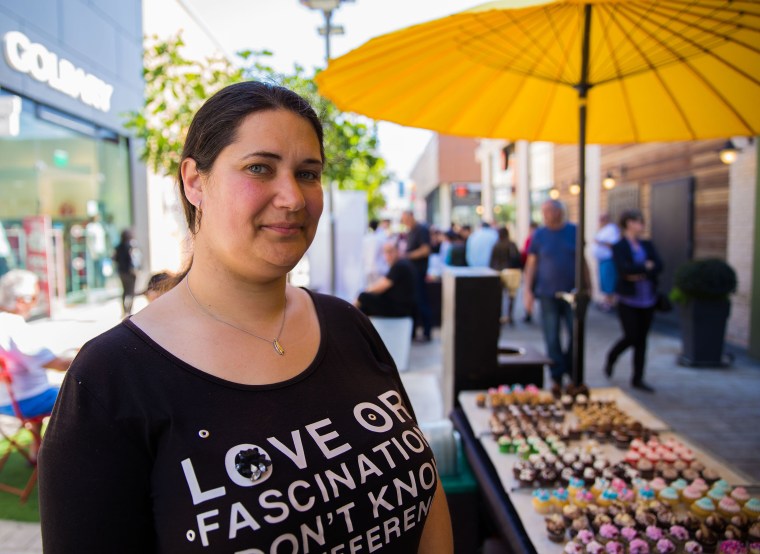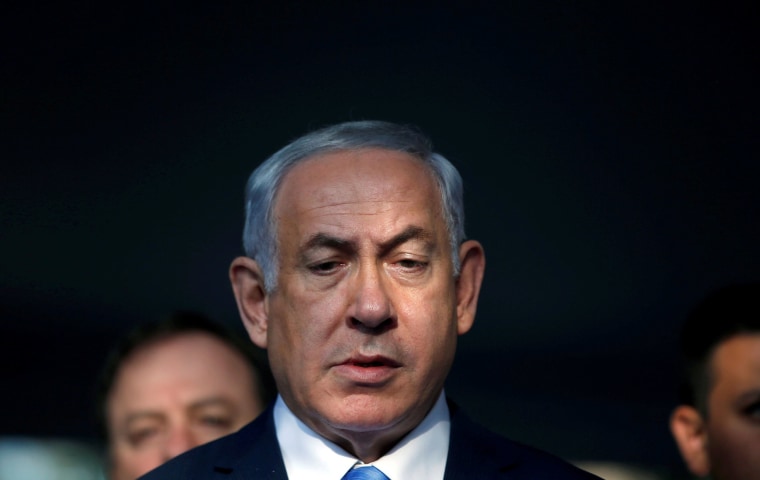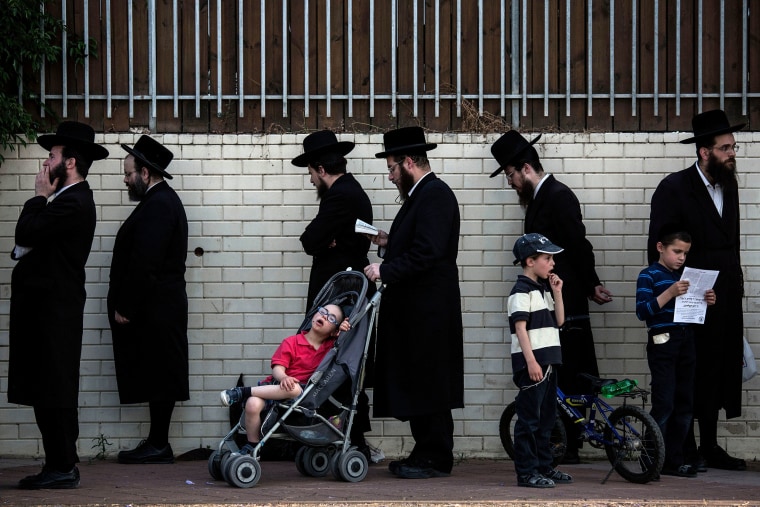ASHDOD, Israel — A open-air market has become an unlikely battleground in a wider struggle that could potentially bring down Israeli Prime Minister Benjamin Netanyahu's government.
For weeks, shop owners in the Big Fashion mall have received warnings and fines for illegally opening on Saturday — the traditional Jewish day of rest.
The dispute is part of a long-running debate between the country’s secular and religious populations over the role of the Orthodox in public life. It affects how much power religious Jews have over less-observant Jews on issues like shopping and riding public transport on the Sabbath, and whether the ultra-Orthodox will participate in traditional Israeli institutions like the military.
“It’s OK that there’s a Sabbath and people observe the Sabbath, but this is my salary,” said Karin Cohen, a mother of three who sells cupcakes and empanadas in the seaside city of Ashdod.

Cohen, 38, says she can only work on weekends — Friday and Saturday — and the enforced Saturday closings would kill off her business.
“I would like to walk around and honor the Sabbath, but I can’t afford to,” she said.
Ashdod's shopping dispute has prompted protests on both sides of the issue.
It also is symbolic of clashing world views and comes amid demands from an ultra-Orthodox party that is a member of the government coalition, United Torah Judaism (UTJ), that men from these communities continue to be allowed to skip mandatory military service. This has traditionally been the case because these men intensively study and interpret Judaic texts, which in 1948 was deemed to provide an essential service to the Jewish people.
These military exemptions anger some Israelis, who accuse ultra-Orthodox men of being draft dodgers. Others worry that by not joining the army, they are missing out on a central experience of Israeli life.
Now the disagreement over whether they must enlist in the military — as the majority of Israelis must do at the age of 18 — threatens to break up the country's fragile coalition government. The ultra-Orthodox lawmakers said their support for next year’s budget depended on getting their way — even if this meant bringing down the government and triggering an election.
In a twist, municipal workers in Ashdod who hand out warnings and fines for opening on Saturday have stayed away in the last two weeks, allegedly because, as Jews, they are not allowed to work on the Sabbath.
"Nobody has a monopoly on Judaism.”
While shops have long been officially barred from opening on the Sabbath, or Shabbat, as it is known in Hebrew, these regulations have not been followed in the more secular parts of the country, as well as in Israel’s non-Jewish minority communities. In January, the Knesset passed a law enforcing these closings, prompting demonstrations on both sides of the issue.
Alon Shani, the owner of Camden and Shoes, who has received several warnings for staying open on Saturday, says the pressure upsets him because he says nobody has a right to tell him how to run his life and business.
“He can live his life the way he wants to — and I can, too,” said the 40-year-old, referring to a hypothetical Orthodox Israeli choosing to live according to strict laws. “Nobody has a monopoly on Judaism.”
Residents of Mea Shearim, Jerusalem’s oldest ultra-Orthodox, or Haredi, neighborhood, are also feeling the pressure. They say calls for religious men to serve in the military and for a loosening of rules governing Sabbath openings would endanger their way of life and outlook on the world.
Working on the Sabbath is “the worst sin that can be — there is no blessing in that work,” said Joseph Weiss, 60, a jeweler in Mea Shearim.

A similar outlook informs his attitude toward military service.
“The army is trying to take me off [God’s] path," Weiss said. “Most of the residents here are against enlistment — we cannot compromise," he said, fearing one concession would lead to more changes.
While some Haredi men can and do serve in a special gender-segregated unit, most choose deferment.
Shay Rodnick, who owns a Judaica shop in Mea Shearim, is a little more relaxed about Saturday opening hours — as long as these businesses are not nearby.
“On a personal level it doesn’t bother me — they have an open account with God,” he said.
Rodnick, 50, said that many Haredis feel the government is trying to take things from them, such as subsidies given to Israelis for having children and religious scholars for studying.
“The Haredi people feel stipends are being reduced — they are always trying to take stipends away from us,” Rodnick said.
Because Haredis often have large families, they tend to receive proportionally more in government aid than other Israelis — a practice criticized by some who say this extra support is unfair, especially when most ultra-Orthodox do not serve in the military.
The tensions between the ultra-Orthodox and wider society have been simmering since Israel's founding, when its first prime minister, David Ben-Gurion, granted military exemptions to around 400 religious scholars. This came after yeshivas were virtually wiped out in the Holocaust and religious studies was seen as central to re-establishing Jewish culture and identity.
Fast forward to today, when the ultra-Orthodox make up around 12 percent of the country’s close to 9 million citizens. They use their electoral power to push their agenda in Parliament.

Netanyahu's government recently rolled back legislation aimed at increasing conscription, but this was struck down by the Supreme Court. The court has demanded new legislation within a year.
While Netanyahu's Likud party is doing well in the polls, he is coming under pressure from religious parties. The prime minister is also fending off sprawling corruption investigations and some members of his coalition smell blood in the water.
On Thursday, Defense Minister Avigdor Lieberman posted a video for Purim — a day traditionally marked with jokes and costumes — that openly mocked ultra-Orthodox coalition partners from United Torah Judaism.
Wearing a military uniform and fake sidelocks as worn by many Hasidic men, Lieberman joked that two top ultra-Orthodox leaders should join elite military units. But Lieberman, who is a member of the secular and right-wing Yisrael Beytenu party, isn’t really joking.
By calling the UTJ’s position tantamount to draft dodging, he also implicitly challenged Netanyahu and his Likud Party’s supremacy.
“Yisrael Beytenu will not surrender and will not allow this to happen,” he said in a separate Facebook post.
